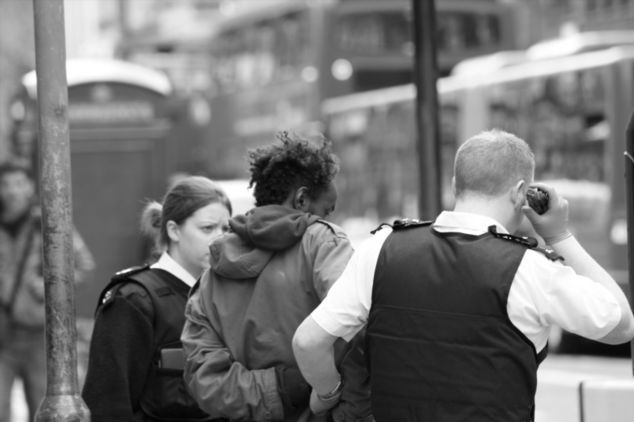SallyB2
Trading Posts: Meet the Outlaws

Well, by outlaws, we mean those not awfully welcome in London’s shops. *Retail criminals*. Shoplifters, thieves, hustlers, beggars, general ne’er-do-wells, momes and breed-bates. A new report indicates that business crime is up, and whilst we are sure that the figures include everything from major embezzlement to illicit use of the photo-copier, what they’re really talking about here is crimes against the shopkeeper. Mostly theft. The topic has been in the news quite a lot this year: it’s the recession you see. Lack of spondulicks can make a man (or woman) desperate. The Association of Convenience Stores has asked for a bit more of a concerted effort to combat shop crime: the current system of issuing ‘Public Notice Disorder’ tickets for the thieving felons is generally perceived as an insult.. As London is the joint shoplifting capital of the country, with help from our friend the shopkeeper, we thought we’d take a closer look at the culprits. So meet:
The Eastern European beggar: there are a hard core of these who are professional steamers, entering a shop all together and scattering, emptying shelves into their grubby apron pockets as they go. The only real solution is to bar them (yeah, like that’ll be easy) or get to the door before they get in and lock it. Calling the police a few times does help - they really don’t like the police.
The Cheap Con Artist: oh dear. Who do these guys take us for? This is Mr. ‘I lost me wallet and I need £1 to get home’ sob story. 50 shops, £50 quid a day - easy money. And they’re not even technically committing a crime.
The Confuser: horrid spiteful lowlife, these. They’ll enter a shop, and either buy something small or ask for change. As soon as the till is open, they start quibbling over the change they’ve been given, and throw the money back at the shopkeeper, demanding a refund. Their secret weapon here is VOLUME, as when someone shouts it usually induces stress and confusion. Whilst the shopkeeper flaps, they snatch - quite often a wad of notes - and they’re gone before you can say ‘WTF?’
The Crack Head: dangerous. Very dangerous. A junkie in search of a fix is not something to mess with. And they’re even worse if they’ve just had their fix and are on planet ga-ga. Time for the shopkeeper to hit all his panic buttons.
Care-less in the Community: London has a lot of people with problems. And some of those are, well, scary. We’re not just talking about the helpless and hopeless street drinkers, but those with really aggressive psychiatric problems. Most small shopkeepers are only too happy to help those they encounter, but the line is crossed when things turn violent.
Kids. Shopkeepers HATE kids. Nothing personal. Even the good ones cause havoc. But when the bad (no such thing as a bad kid: really, there isn’t) naughty ones get together and enter a shop, well
‘ And they know their rights, street urchins these days - you can't touch them or they scream blue murder. 'No more than two school children at a time’ is the only solution.
The Clueless Shoplifter: these are the worst. Because if they’re no good at shoplifting, it means that they are probably only doing it out of utter desperation. It is impossible for a shopkeeper to call the police on a young mother who is clearly in need, or a young man who looks like he needs a square meal. What to do, what to do???
The Opportunist: usually women for some reason. This sort sees a shopkeeper tied up at the till or engaged in conversation, charges in to the shop, grabs stuff and exits all before you can say 'Londonist rocks'. Very small shop keepers (that is small shops, not midget keepers) have the advantage here: they greet all their customers personally, and can spot the opportunist easily, even with their back turned.
The Pro: well, the professional shoplifter never nicks stuff on his own patch, and rarely from small shops. We’ll leave the bigger West End stores to comment on them.
In London now most small shops have some sort of CCTV as a deterrent - and this really does help. Panic buttons and alarms are all good. Also, crime can to a certain extent be designed out of a shop. Many small shops occlude their windows with small ads, which is an invitation to crims - if the shopkeeper and his till are well lit and visible near the window, they are less likely to be the target of premeditated theft. Best toy to come out of the security sector in many years is the Alert Box, which many councils in London have trialed with great success. It consists of a series of alarm boxes placed in up to 20 local businesses: first sign of trouble, the shopkeeper can hit his red button and his neighbours all come running. Or alternatively simply send a warning to say that there are yobs or thieves abroad. Brill. Some traders have even set up a code to warn of traffic wardens operating in the area.
But yeah, basically, London retailers do need more help. Of all sorts. At the moment most big stores have a blanket policy of prosecution, which doesn't work. And most small shops are forced to let thieves go with a clip round the ear: locking the door and asking a shoplifter to wait 'til the police arrive just doesn't happen. More coppers on the beat. A greater deterrent when caught. And smiles. We reckon you should make a point of smiling at your pet shopkeeper this week to cheer him up.
Shoplifter by charbel.akhras via the Londonist flickr pool




